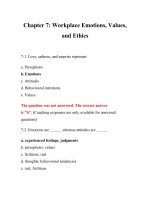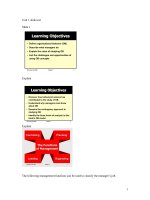Organizational behavior: Lecture 7 - Dr. Mukhtar Ahmed
Bạn đang xem bản rút gọn của tài liệu. Xem và tải ngay bản đầy đủ của tài liệu tại đây (511.21 KB, 39 trang )
Organizational
Behavior
(MGT-502)
Lecture-7
Summary
of
Lecture-6
The Importance of Values
Behavior
Motivation
Perceptions
Attitudes
Values
Sources of values.
–Parents.
–Friends.
–Teachers.
–Role models.
–External reference groups.
Values Across Cultures
Power Distance
Individualism or Collectivism
Quantity or Quality of Life
Uncertainty Avoidance
Long-Term or Short-Term
Handling Cultural Differences
Learn about others’ values
Avoid prejudging
Operate legitimately within others’
ethical points of view
Avoid rationalizing
Refuse to violate fundamental values
Be open
Today’s Topics
The Importance of Values
Behavior
Motivation
Perceptions
Attitudes
Values
Rights
– Right: a person’s just claim or
entitlement
– Focuses on the person’s actions or the
actions of others toward the person
Legal rights: defined by a system of
laws
Moral rights: based on ethical standards
– Purpose: let a person freely pursue
certain actions without interference
from others
Values
Attitudes Define
An attitude is a mental stage of readiness,
learned and organized through experience,
exerting a specific influence on a person’s
response to people, objects, and situations
with which it is related.
A persistent tendency to feel and behave in
a particular way toward some object.
Components of
Attitudes
Cognitive -- thinking
Affective -- feeling
Behavioral -- doing
Attitudes
Evaluative statements or judgments concerning objects,
people, or events.
– Cognitive component of an attitude is the opinion or belief
segment of an attitude.
– Affective component is the emotion or feeling segment of an
attitude.
– Behavioral component of an attitude is an intention to
behave in a certain way toward someone or something.
Sources of Attitudes
– Acquired from parents, teachers, and peer group members.
– “Genetic” predispositions.
– Observations, attitudes that we imitate.
Attitudes less stable than Values
Evaluative statements or judgments
concerning objects, people, or events.
Sources of Attitudes
– Acquired from parents, teachers, and peer
group members.
– Genetic? predispositions.
– Observations, attitudes that we imitate.
Attitudes less stable than Values
Types of Attitudes
Job satisfaction
Job involvement
Organizational
commitment
Types of Attitudes
Job Satisfaction
– . . . refers to an individual’s general attitude toward his
or her job.
Job Involvement
– . . . measures the degree to which a person identifies
psychologically with his or her job and considers his or
her perceived performance level important to selfworth.
Organizational Commitment
– . . . a state in which an employee identifies with a
particular organization and its goals, and wishes to
maintain membership in the organization.
The Three Components of Attitudes
Stimuli
Job Design
Work
environment
factors
Managerial style
Company
policies
Technology
Cognition
Beliefs and
values
Affect
Feelings and
emotions
Behavior
Intended
behavior
“My supervisor is unfair.”
“Having a fair supervisor is
important to me.”
“I don’t like my
supervisor.”
“I’m going to request a
transfer.”
Job Satisfaction
What Determines Job Satisfaction?
–
–
–
–
–
–
Mentally Challenging Work
Equitable Rewards
Supportive Working Conditions
Supportive Colleagues
Personality - Job Fit
Heredity/Genes
Job Satisfaction and Employee Performance
–
–
–
Satisfaction and Productivity
Satisfaction and Absenteeism
Satisfaction and Turnover
Implications for Managers
Values strongly influence a person’s attitudes.
An employee’s performance and satisfaction
are likely to be higher if his or her values fit well
with the organization.
Managers should be interested in their
employees’ attitudes because attitudes give
warning signs of potential problems and
because they influence behavior.
What is Meant by Job
Satisfaction?
Job Satisfaction is an emotional response
to a job situation
Job Satisfaction determined by how well
outcomes meet or exceed expectations
Job Satisfaction represents several related
attitudes
– The work itself
– Pay
– Promotion opportunities
– Supervision
– Coworkers
Attitudes Associated with
Job Satisfaction
Work
Itself
Job
Security
Coworkers
Supervision
Promotion
Opportunities
Pay
Working
Conditions
Outcomes of Job Satisfaction
Satisfaction and Productivity
Satisfaction and Turnover
Satisfaction and Absenteeism
Satisfaction and Citizenship Behavior
The Effect of Job
Satisfaction on Employee
Performance
Satisfaction and Productivity
– Satisfied workers aren’t necessarily more productive.
– Worker productivity is higher in organizations with
more satisfied workers.
Satisfaction and Absenteeism
– Satisfied employees have fewer avoidable absences.
Satisfaction and Turnover
– Satisfied employees are less likely to quit.
– Organizations take actions to cultivate high
performers and to weed out lower performers.
Job Satisfaction and OCB
Satisfaction and Organizational Citizenship
Behavior (OCB)
– Satisfied employees who feel fairly treated by
and are trusting of the organization are more
willing to engage in behaviors that go beyond
the normal expectations of their job.
Are happy workers better workers?
Satisfaction causes performance
Performance causes satisfaction
rewards causes both performance and
satisfaction









